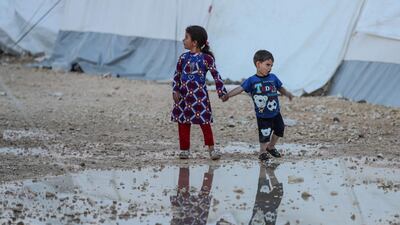The Syrian regime, with its Iranian and Russian supporters, has not spared any effort to punish its opponents. From barrel bombs to siege-and-starve tactics, the towns that rose up against President Bashar Al Assad and his regime have been met with brute force.
As a result, Syria has witnessed the largest displacement – between internal displacement and refugee exodus – that the world has witnessed since the Second World War. For those who have left their homes and cities, the suffering often does not end. Whether it is the pain of loss associated with forced exile or the economic hardship of leaving with very little, those who are displaced continue to suffer in different ways.
Now the Syrian regime has come up with a punishment for those who have fled. A new law that has become known as "decree 10" allows the Syrian government to seize lands from private citizens for "development projects". However, those Syrians who are displaced, in opposition-held territories or who are refugees have no way of going to claim their properties and rights.
More than 5.6 million Syrians are refugees and 6.1 million are internally displaced. That means at least half of Syria's population is displaced. Of course, not all of these are land or property owners. Children make up half of those who have been displaced. "Decree 10" represents how the Syrian regime intends on creating realities that lock out those who are displaced. This new law adds one more obstacle to those dreaming of a return to their country. It can also mean a loss of rights for the children of those who have fled. In addition to the tangible and practical costs of such a law, the political message is clear : those who have left are being permanently rejected.
Initiating land laws to punish entire populations is neither new nor unique. Instances of civil war and dictatorship have resulted in similar measures. According to the World Bank's Paul Prettitore, who was the property law coordinator at the Office of the High Representative in Sarajevo after the Dayton Peace Agreement, property laws were used in Bosnia and Croatia to cement ethnic displacement and population swaps in the Balkans as war ravaged the region.
Countries hosting Syrian refugees, especially Lebanon, have voiced concerns that this law will make repatriation even more difficult. Lebanese foreign minister Gebran Bassil, in a letter to his Syrian counterpart Walid Muallem, said: "Lebanon's fear that the conditions imposed by this law will hinder the return of a not-insignificant number of displaced to their hometowns.” The Lebanese minister has previously pushed for Syrians to be returned to Syria, raising fears that any repatriation would be involuntary. While many refugees long to return to their homes, any forced returns would breach the rights of those who are most vulnerable.
The issue of property rights has come to the surface again due to Lebanon’s latest statements, yet the fear of land grabs and redistribution have abounded in Syria for years. Two years ago, the Syrian authorities determined that a "security clearance" was needed before any land transactions are permitted. This has meant that those who had not previously registered their lands or families that want to process land inheritance have not been able to do so.
A somewhat insignificant bureaucratic decision allowed the Syrian regime to limit the freedom of land ownership or transfer for anyone unable to get the necessary "security clearance". Any Syrian who was opposed to the regime or sought refuge abroad was impacted, so most chose not to sell or buy lands. They believed that the deeds they had, or their claim to their land, would hold true once this seven-year war came to an end. Until now, the Syrian government has not been able to widely enforce land seizures. Institutionalising decree 10 could change all of that.
One issue that could affect hundreds of thousands of Syrian families is the lack of official documentation of land ownership. The World Bank says local Syrian statistics estimate that only half of Syrian land is officially registered. Moreover, many families decide not to subdivide land inheritance, meaning that some members of the family might still be in Syria but one or two members who have jointly inherited a land can hold up the process of registering it. Even more troubling is the emergence of a black market for forged documents. Doubled with high levels of corruption in a war economy, the possibility of forged land deeds being used is high. The threat of losing lands has brought new troubles to Syrians.
According to UNHCR, the average time a refugee remains a refugee is 17 years. Those who are internally displaced or have been forced into refuge often seek a way to go back home. They must be supported in their current displacement or if they choose to go back to their homeland. However, when Syria's war ends and millions choose to go back to their cities and towns, they may find they no longer have a home to go back to. That is a danger that host countries of refugees and international organisations like the International Organisation for Migration and UNHCR must counter.


